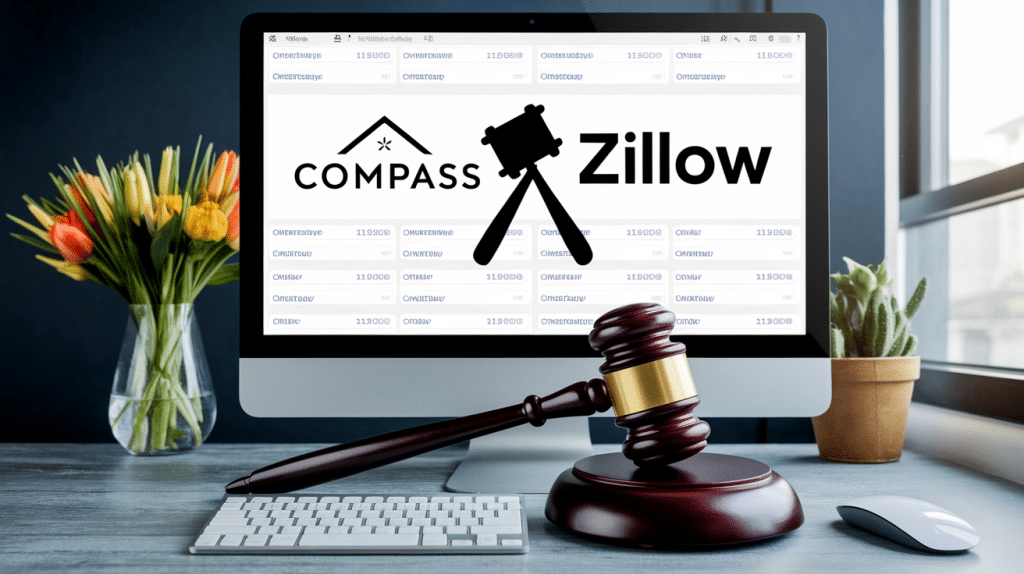Compass has escalated its ongoing dispute with Zillow by filing a lawsuit over the new Zillow rule requiring all publicly marketed home listings to appear on its platform within one day. This policy, which you should know about if you’re involved in real estate, threatens to reshape how listings are shared online and impacts Compass’s unique 3-phased marketing strategy. As this legal battle unfolds, your understanding of the tension between major real estate brokerages and home search engines becomes key to navigating the evolving housing market landscape.
Legal Clash: Compass vs. Zillow
Compass’s lawsuit against Zillow intensifies the ongoing tussle over how home listings should be shared across digital platforms. At issue is Zillow’s “Zillow ban,” a policy mandating that any listing marketed publicly elsewhere must appear on Zillow within 24 hours or be excluded entirely. This rule directly impacts Compass’s multi-phase marketing approach by limiting private and “coming soon” listings on other platforms. You can see how this legal battle could reshape the relationships between brokerages, listing sites, and homebuyers navigating an already complex real estate market.
Allegations of Anticompetitive Conspiracy
Compass alleges that Zillow, along with Redfin and eXp Realty, formed a de facto conspiracy to dominate the online home search space through restrictive listing policies. The so-called “Zillow ban” attempts to force all publicly marketed listings onto Zillow’s platform, effectively squeezing out competition.

Zillow’s Defense and Consumer Transparency Claims
Zillow defends its policy as fostering market transparency and fairness by insisting that any publicly marketed listing is accessible to all buyers on a single platform—Zillow. The company stresses that hiding listings fragments the market and undermines consumer choice, making homeownership harder in today’s tight inventory and affordability environment. From your perspective, Zillow positions itself as a consumer advocate preventing opaque sales practices that could confuse or limit buyers.
Further elaborating, Zillow highlights that their rule responds to recent sales tactics that reduce listing visibility, such as exclusive or delayed postings on niche platforms. By aligning with policies like the National Association of Realtors’ Clear Cooperation rule, Zillow aims to streamline the listing process and ensure all buyers see the same inventory promptly. This approach intends to increase competition among buyers while providing consistent, transparent data — including Zestimate valuations and climate risk assessments — that you rely on when evaluating properties. Zillow argues these components enhance buyer confidence, contrasting sharply with Compass’s claim that such transparency drives sellers away.
The Zillow Ban: Implications for Real Estate Listings
The Zillow Ban significantly alters how listings are shared in the digital real estate marketplace, forcing properties publicly marketed anywhere to be listed on Zillow within 24 hours or face exclusion. This requirement diminishes the ability of brokers like Compass to control their marketing timeline, potentially eliminating staged sales strategies and private listing phases. For sellers and agents, the policy raises stakes by prioritizing Zillow’s platform as the near-exclusive digital gateway—impacting how and when your home appears to buyers and reshaping competition among brokerages and listing platforms.
Overview of Zillow’s New Policy
Zillow’s policy mandates that any home listing publicly marketed — whether on social media, websites, or emails — must be submitted to Zillow within one day, or the listing can no longer appear on the platform. Enforced starting June 30, the rule aims to prevent listings from being “hidden” on other platforms, ensuring all buyers can access every publicly available property through Zillow. Zillow defends this as a fairness measure to create a unified market and avoid fragmentation that could limit consumer choice amid tightening inventory and affordability challenges.
Compass’s Response and Market Strategy Challenges
Compass argues that the Zillow Ban undermines its innovative 3-phase marketing approach, particularly the “Coming Soon” stage designed to build buyer interest before wide exposure. Since this phase involves publicly marketing listings on Compass’s site without immediately listing on Zillow, the policy forces premature full disclosure on Zillow, disrupting Compass’s ability to generate exclusivity and test price points. This disrupts both seller flexibility and Compass’s traditional lead-generation model across multiple listing platforms.
The company highlights that nearly 35% of its listings were, as of February, circulated as “Compass Private Exclusive” or “Coming Soon,” phases which enable a controlled rollout to attract targeted buyers. Compass also stresses that Zillow’s public-facing “Zestimate” and “Climate Risks” labels introduce negative insights that may deter sellers from listing openly early on Zillow, pushing them toward private marketing. By compelling these pre-market listings onto Zillow, the ban challenges Compass’s fundamental strategy to maximize seller options and potentially drives sellers to navigate around Zillow’s growing dominance, intensifying the competitive tension in digital real estate advertising.
Navigating Marketing Strategies: Compass’s Three-Phase Approach
Compass structures its home-selling process around a distinctive three-phase strategy. Starting with a private listing phase designed to “test” the market, it moves to a “coming soon” stage where listings gain early exposure exclusively on Compass’s platform. The final phase unleashes the listing publicly across multiple platforms, maximizing visibility. This approach aims to balance exclusivity and broad market reach, but it faces challenges amid Zillow’s new policy that demands quicker, wider public advertising of listings, directly impacting Compass’s staged rollout and marketing control.
Breakdown of the Private Listing Strategy
The initial private listing phase allows sellers to gauge buyer interest without full market exposure, often limiting the listing only to select buyers or agents. Approximately 35% of Compass homes were in this phase as of mid-February, labeled “Compass Private Exclusive” or “Coming Soon.” This tactic intends to create a controlled environment, potentially refining pricing and demand before the property hits broader platforms.
Criticism and Controversy Surrounding Private Listings
Critics contend that Compass’s private listings foster conflicts of interest by encouraging deals within its own agent network, enabling the brokerage to collect commissions from both buyer and seller. These practices raise concerns about reduced transparency and fair market competition, as private phases can obscure listings from wider buyer pools and inflate sales commissions.
Further scrutiny highlights how Compass’s private strategy may limit marketplace competition, especially with homes bypassing public platforms like Zillow during early phases. While Compass denies encouraging exclusive deals, observers note that these methods could distort pricing and buyer choices. This controversy intensifies under Zillow’s new requirement that “coming soon” listings must be published there within 24 hours, challenging Compass’s phased model and reshaping agent behaviors industry-wide.
The Competitive Landscape: Redfin and eXp Realty’s Role
Redfin and eXp Realty have taken significant roles in Zillow’s new listing rule rollout, adhering quickly to the so-called “Zillow ban.” While Compass accuses these brokerages of conspiring with Zillow to stifle competition, neither Redfin nor eXp are named as defendants in the suit. eXp explicitly denies any collusion, emphasizing its independent business decisions. You can see how their early adoption of Zillow’s policy strengthens Zillow’s market position, reinforcing the digital dominance that Compass challenges in court.
The Clear Cooperation Policy’s Impact
The Clear Cooperation Policy, implemented in 2019 by the National Association of Realtors, mandates that any publicly marketed property must be submitted to the local MLS within one business day. This policy underpins Zillow’s new rule by formalizing how quickly listings must be centralized and shared. For you as a seller or buyer, this means less fragmentation and quicker access to listings—but it also pressures brokerages to list on major platforms like Zillow, limiting alternative marketing strategies.
Reactions from Competing Brokerages
eXp Realty sharply criticized Compass’s lawsuit, labeling it as a desperate move by a company that has yet to turn a profit. CEO Leo Pareja framed Zillow’s policy as consumer-friendly, providing greater access rather than restricting it. Redfin has remained silent publicly, but its compliance with the rule suggests acquiescence to Zillow’s market strategy. Your perspective on these reactions might influence how you evaluate the competitive dynamics affecting property listings today.

Economic Ramifications: What This Means for the Market
The outcome of Compass’s lawsuit against Zillow could significantly reshape market dynamics, particularly impacting listing distribution and brokerage competition. If Compass prevails, you might see a shift toward greater decentralization of listings, allowing brokers more control over how homes are marketed. Conversely, Zillow’s rule aims to consolidate listings on its platform, enhancing transparency but potentially increasing selling costs for consumers. This tug-of-war introduces uncertainty around listing visibility, commissions, and overall accessibility, factors that could influence home prices and transaction speed in an already tight housing market.
Potential Changes in Consumer Behavior
You could encounter a more fragmented search experience if the lawsuit limits Zillow’s access to listings, forcing buyers to visit multiple sites. Alternatively, Zillow’s policy encourages listing centralization, promoting easier comparisons but also exposing sellers to more public data like “Zestimates” and climate risk reports, which some buyers might use to negotiate harder or even dismiss properties. Such shifts may change how quickly homes sell and alter buyer expectations regarding transparency and data availability.
Future of Online Home Listings and Brokerage Dynamics
Digital home listings are evolving into battlegrounds where platforms fight for dominance, with Zillow leveraging its 80% market share to enforce policies like the “Zillow ban.” If brokers like Compass successfully push back, you could see a resurgence in private or staged listings that test markets before going public, redefining competitive strategies. Meanwhile, alliances with platforms such as Redfin or eXp Realty suggest that brokerage dynamics will increasingly hinge on cooperative adherence to digital listing rules—or strategic challenges to them.
Expanding on this, the interplay between brokers and platforms will determine the future shape of the market. For instance, Compass’s phased marketing strategy—starting private, then moving listings through staged public exposure—challenges Zillow’s push for immediate, broad listing availability. Should Compass’s lawsuit succeed, the industry may fragment into parallel marketing ecosystems, with some brokers prioritizing exclusivity and price testing, while others embrace full transparency. This tension not only influences how quickly buyers can access comprehensive data but also how commissions are negotiated, potentially driving innovation in brokerage models and online listing presentation.
Conclusion
Presently, you are witnessing a significant clash between Compass and Zillow that highlights the evolving tensions in real estate marketing and listing visibility. Compass challenges Zillow’s new “ban” rule, arguing it limits seller options and disrupts their phased marketing approach. As you follow this case, it illustrates how digital platforms are reshaping real estate competition and your experience as a buyer or seller, emphasizing the balance between transparency and market control in an increasingly online home search environment.
Frequently Asked Questions
Warning: Trying to access array offset on false in /home/financialtimez/public_html/wp-content/plugins/faq-schema-ultimate/public/class-faq-schema-ultimate-public-shortcode.php on line 110
Warning: foreach() argument must be of type array|object, null given in /home/financialtimez/public_html/wp-content/plugins/faq-schema-ultimate/public/class-faq-schema-ultimate-public-shortcode.php on line 110
Future of Online Home Listings and Brokerage Dynamics
Digital home listings are evolving into battlegrounds where platforms fight for dominance, with Zillow leveraging its 80% market share to enforce policies like the “Zillow ban.” If brokers like Compass successfully push back, you could see a resurgence in private or staged listings that test markets before going public, redefining competitive strategies. Meanwhile, alliances with platforms such as Redfin or eXp Realty suggest that brokerage dynamics will increasingly hinge on cooperative adherence to digital listing rules—or strategic challenges to them.
Expanding on this, the interplay between brokers and platforms will determine the future shape of the market. For instance, Compass’s phased marketing strategy—starting private, then moving listings through staged public exposure—challenges Zillow’s push for immediate, broad listing availability. Should Compass’s lawsuit succeed, the industry may fragment into parallel marketing ecosystems, with some brokers prioritizing exclusivity and price testing, while others embrace full transparency. This tension not only influences how quickly buyers can access comprehensive data but also how commissions are negotiated, potentially driving innovation in brokerage models and online listing presentation.
Conclusion
Presently, you are witnessing a significant clash between Compass and Zillow that highlights the evolving tensions in real estate marketing and listing visibility. Compass challenges Zillow’s new “ban” rule, arguing it limits seller options and disrupts their phased marketing approach. As you follow this case, it illustrates how digital platforms are reshaping real estate competition and your experience as a buyer or seller, emphasizing the balance between transparency and market control in an increasingly online home search environment.

